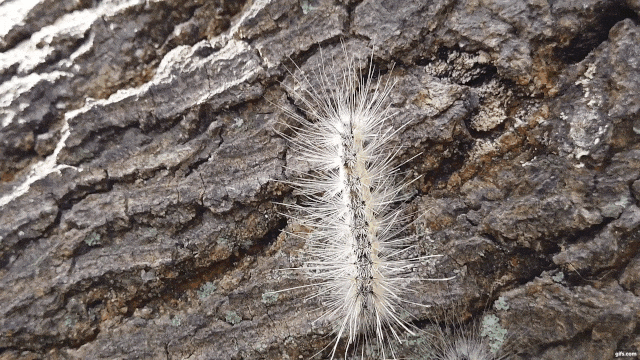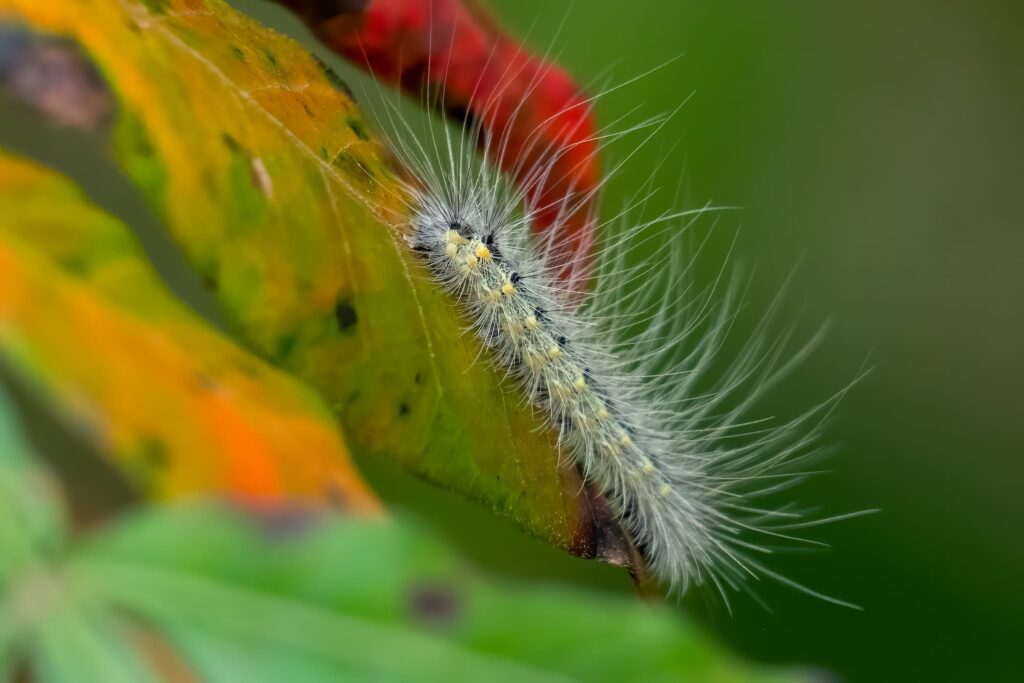Fall Webworms are one of the most common foliage-feeding caterpillars in our north Texas region, and its immature stage is the white moth.
What Are Fall Webworms?
Fall webworms are a type of insect that can be found on trees and shrubs throughout much of the United States. They are called “fall” webworms because they are most active in the late summer and early fall months.
Fall webworms are small, hairy caterpillars that spin webs around the leaves of trees and shrubs. These webs can be unsightly and can eventually cover entire branches or even the entire tree. They are known to feed on the leaves of a wide variety of trees and shrubs, including pecans, mulberries, sweetgums, and many others.


Fall Webworm Life Cycle
The fall webworm life cycle begins when adult female moths lay their eggs on the undersides of leaves. When the eggs hatch, the young caterpillars begin to spin webs around the leaves and start feeding. As the caterpillars grow, they continue to feed and spin webs around more and more leaves, eventually covering entire branches or even the entire tree.
Are They A Threat To Trees and Shrubs?
Fall webworms are generally not a serious threat to the health of trees and shrubs. While they can defoliate trees and shrubs, most trees are able to withstand a certain amount of defoliation without suffering any long-term damage. However, in cases where a tree is already stressed or weakened, fall webworms can potentially cause more serious damage.
Prevention and Treatment
There are several methods that can be used to control fall webworms, including physical removal, chemical control, and natural predators. One of the simplest and most effective methods for controlling these worms is physically removing the webs and caterpillars from the tree or shrub. This can be done by hand or with a long stick, being careful not to damage the tree or shrub.
If physical removal is not practical or if the infestation is too large to be controlled through physical removal alone, chemical control may be necessary. There are several types of insecticides that can be used to control fall webworms, including those containing the active ingredients Bacillus thuringiensis or spinosad. It is important to carefully follow the label instructions when using any type of insecticide, and to consider the potential impacts on other non-target organisms such as birds and beneficial insects.
Another method for controlling them is to encourage the presence of natural predators such as birds and parasitic wasps. These predators can help to reduce the population of fall webworms by feeding on the caterpillars and eggs. Planting a variety of native flowering plants and providing a source of water can help to attract these beneficial insects and animals to the area.
Conclusion
In most cases, Fall webworms are more of a nuisance than a serious threat to the health of trees and shrubs. While they can defoliate trees and shrubs, most trees are able to withstand a certain amount of defoliation without suffering any long-term damage. However, in cases where a tree is already stressed or weakened, fall webworms can potentially cause more serious damage. By using physical removal, chemical control, or encouraging the presence of natural predators, it is possible to effectively control fall webworms and protect the health of trees and shrubs. Are you looking for other Tree Insects?
Want To Talk To A Certified Arborist?
Do you have more questions about your oak tree? Do you have oak wilt on the trees on your property? Do you have Tree Disease on your property in Texas? Call us today at (817) 799-7808 to talk to our Tree Care Experts.
North Texas Tree Care
As a North Texas-based tree care company, Oakwilt.org does more than just provide industry-leading tree care, we’re here to serve our beloved community. By giving our North Texas trees proper care and maintenance through routine tree check-ups and treating them for oak wilt when necessary, we can promote a greener, more sustainable North Texas community. For help with tree disease treatment and tree nutrition, tree care and tree insect management, soil conditioning, and more, contact our ISA Certified Arborists to get started.
Oakwilt.org is a full-service sustainable tree care company offering residential and commercial tree services and tree disease treatment and management in Dallas, Waco, Austin, Fort Worth, San Marcos, San Antonio, DFW, and more. Contact our North Texas tree care experts at (817) 799-7808 and enjoy 5-star rated tree care customer service and the best tree health services in North Texas!
To learn more about North Texas Tree Insects: Fall Webworms, Oak Leaf Rollers, and Sap-Eating Bore Beetles, call our North Texas team of Arborist
at (817) 799-7808 or fill out the contact form.
We’re a little different than the average tree care company.
Learn more about Oakwilt.org ISA Certified Arborists!
Our North Texas-based tree doctors can explain how sustainable tree care services add more value to your properties.
Find out more today by giving us a call today.

